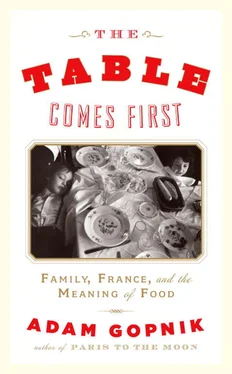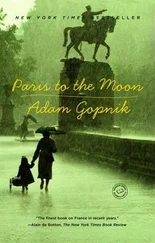And yet, looking around the room at the red-faced and the silver-haired, the soon-to-be-thrombotic and the recently revalved, the women who still tied their scarves to their bags in the manner of Babe Paley, and men who still dressed in trim gray suits in the manner of her husband, one realized that it was the restaurant’s thorough and even comic Frenchness that had made it so entirely New York. The banquettes, the lovely red-and-white-striped awning above the bar, the flow of penguined waiters, and above all those murals, showing Basque harbor scenes—no truly French place could be so resolutely French, any more than a truly New York restaurant would ever do itself up in pigeons and water towers. The colors, the open brushwork, and the sea beyond—all of which were intended, in 1962, to make you feel as if you had been transported to southwest France in 1905—now made you feel, one last time, as if you had been transported to New York in 1962. The Gotham Bar and Grill could be anywhere; La Côte Basque could only be in New York City.
And the food? It was okay, yet weirdly disconnected. What I had wanted, but not what I had dreamed of. Things were roasted crisp and sautéed crisper, the truffles were black and the Madeira sauce gleaming, and it was all done with the rich and, if truth be told, slightly sick-making flavor of the old-style cooking, of the kind Levin and Tynan had known. Had our palate changed, or had the cooking changed? More the first than the second, surely. The cobbler must stick to his last, but the chef must stick to his customers, and one generation’s delights are the next generation’s curiosities. At lunch, someone said, apropos of Capote, that taste is the last thing that passes after talent is gone—it is the most mysterious of gifts, the one thing that lasts, and yet the one that always changes. It seemed a sufficiently elegiac thought to take back home, along with the memory of lunch.
* * *
So France is gone, France has fled, what was once an empire is like Byzantium just before the Turks won for good—merely a citadel. Yet the Italian empire exists and flourishes. Why the New World over the Old World is easy to understand. But why Italy over France? Perhaps because what Italy represents in the American, or at least the New York mind, is the easy Old World. Olive trees and cheap red wine, pasta and garlic, tomatoes cooked down and cheese scraped off—it all feels accessible, where French cooking, even as it dates, has some evident degree of difficulty about it. The simple acts of French country food—separating eggs, making crème anglaise, beating egg whites, reducing sauces, making liaisons of a sauce and a thickener, even one as plain as flour and butter—are hard or, anyway, harder. Even the peasant dishes can wear you out; even cassoulet is complicated . There was a time, now passed, when the difficulty was itself an attraction. “Mastering” the art of French cooking was the point, and mastery is something different from merely making. We make Italian food; we master French. (And we muddle through with American and Greek and the rest.) We like results .
But there is also something ever more insular about French cooking itself, and that can’t be denied. To read, for instance, the most ambitious recent books about French food is to note a puzzling inability to see beyond France, even in defense or counterattack. Cooking: The Quintessential Art , for instance, by Hervé This and Pierre Gagnaire, is an attempt to revive the old eighteenth-century form of a romantic educational dialogue, in this case between two characters called Jean and Hélène, who flirt, in a cerebral way, as they talk about the meanings of food. The principle of “natural” tastes is explored and rejected, narrative in cooking is considered (“I’m not always sure how to ‘read’—that is, eat—dishes that consist of several elements,” Jean confesses), and the complexities of color and taste laid out (we describe red wine with dark adjectives; white with lighter ones).
But though the wonderfully named This advertises himself, not without reason, as one of the founders of molecular cuisine—he is, in fact, the first, or among the first, to use the term, and his discoveries include the Tesla-like use of an electrical field to smoke salmon—the national question is never raised anywhere in their book. Ferran Adrià and his brother Albert of elBulli, the prime Spanish magicians, if not the first inventors, of molecular cuisine, make no appearance in the book at all, as exemplars or enemies, and Gagnaire—a great cook, to be sure—is uncritically accepted as defining the totality of the new cooking. The dominance of French cooking is simply asserted; the references to history are all narrowly French—Carême and Curnonsky—and even the world’s sense that French cooking is in crisis cannot penetrate the small hard shell of complacency. It reminds the reader of the statues in the Luxembourg Gardens, where Branly’s pedestal advertises him as the inventor of radio, and Lamarck’s as the father of evolution. Neither claim is entirely false, but both are a bit enclosed.
I had a doubled sense of this when I went to an epic French dinner in the company of Beauge. The Beard Foundation in New York had assembled three of the great chefs of France to cook together a single celebratory dinner. The three were Joël Robuchon, Alain Ducasse, and Guy Savoy—but it was well understood by all involved that, as fine a cook and restaurateur as Savoy is, he was very much a kind of Jordan placed between the Egypt of Ducasse and the Israel of Robuchon. Two grand masters of French cooking, the greatest since the heyday of Paul Bocuse, they were legendary for having, if not disdain, then at least a glossy indifference toward each other—not so much diva-ish as duke-like in its rivalry. Beauge is a self-conscious follower of Brillat-Savarin, about whom he has written the entry in the soon-to-appear revised encyclopedia of French food, and whom he recognizes, as not enough do, as the great liberal of gastronomy—the man who carved a progressive path. We agreed that one problem in French food, buried for a long time, to be sure, was the rich but reactionary tradition of Grimod de La Reynière. It made French cooking narrowly French, denying its mixed-up cosmopolitan basis, and turned France toward undue navel gazing. We are paying the price for the national narcissism now, which is, always, not the end of fascination with oneself, but the growing indifference of everyone else.
The lineup of wines was excellent, and we began with a Robuchon dish: potatoes with white truffle. We tasted it.
“Yes, this is delicious. But”—Benedict’s brow furrowed—“how could it not be delicious? If we are to root for white truffles and boiled potatoes?…” We stopped for a pull on a glass of Riesling. Benedict, in a red tie (I had gone tieless, as a little gesture of independence, I suppose), looked at my collar gravely. “I did not know the codes,” he said, “or what degree of idiosyncrasy one could show without spilling over into impertinence.”
Not long before, Guy Savoy had said, “There is no way that this dinner could happen in Paris. There is no way.” The implication was, it didn’t need to be said, that in Paris the competitive pressures would have just been too intense. “Ducasse is an emperor, a CEO of cuisine—omnipresent, omnismart, all-seeing… Robuchon is a man of the kitchen, a man devoted to technique and style. They have no rivalry, merely a division of labors,” one of their supporters who had come from France announced. This view of the two of them is not entirely wrong—it has been a long time since either has been cooking in a kitchen every night—but it does not, perhaps, define the other problem, which is that in Paris they are “marques,” brands, before they are cooks, and the difficulty in bringing them together is less the difficulty of having two sopranos singing side by side than it is the difficulty of making a blend of Pepsi and Coke, or, if that is too plebeian, of Chanel No. 5 and Lanvin’s Arpège. You could do it, of course, but it would not exactly be an advance, or an adventure, just an oddity of the evening. Each has a style so distinct that they can only be left alone.
Читать дальше












